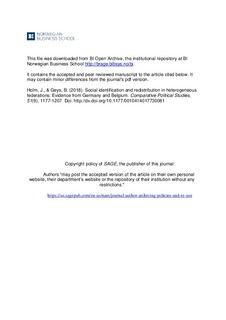Social Identification and Redistribution in Heterogeneous Federations: Evidence from Germany and Belgium
Journal article, Peer reviewed
Accepted version

View/
Date
2018Metadata
Show full item recordCollections
- Publikasjoner fra CRIStin - BI [978]
- Scientific articles [2147]
Original version
Comparative Political Studies, 2018, 51(9), 1177-1207 http://dx.doi.org/10.1177/0010414017730081Abstract
Recent evidence of increasing income heterogeneity within developed countries has reignited debates concerning the redistribution of income and wealth. In this article, we contribute to this debate by assessing the role of individuals’ jurisdictional identification for their preferences toward intrafederation redistributive financial flows. Incorporating insights from social identity theory in a model of redistributive taxation, we show that federal, rather than local, identification can lead individuals to shift their redistribution preferences independent of their narrowly defined personal economic interests. Moreover, contrary to conventional wisdom, welfare state support will sometimes be decreasing in national identification. We empirically assess these predictions using individual-level data from the 2008 German General Social Survey (ALLBUS) and a 2013-2014 survey among Belgian local politicians. Our findings provide strong support for the model’s core predictions in both settings